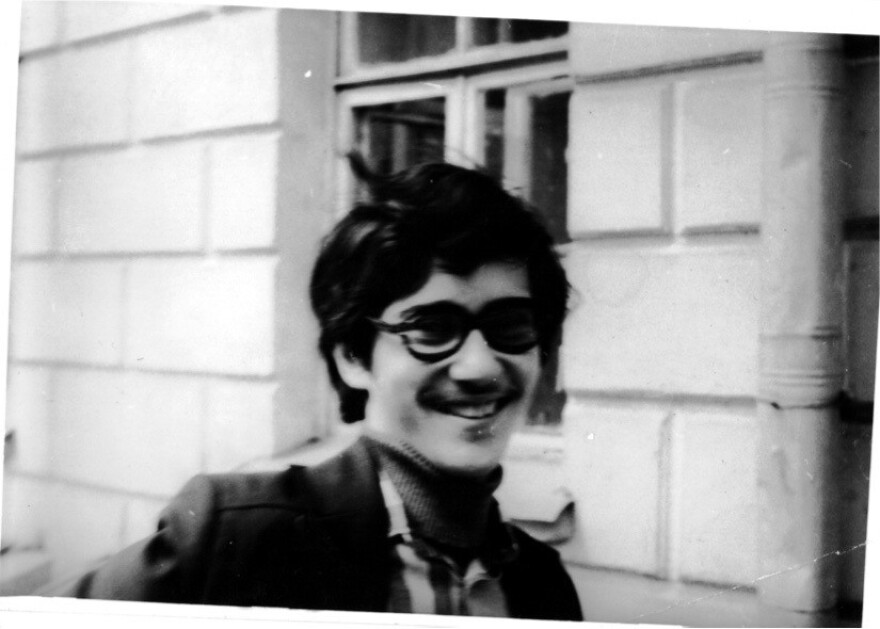America has been called a nation of immigrants.
If that’s the case, then Seattle Symphony is a quintessentially American orchestra.
Twenty-five percent of the musicians, including French-born conductor Ludovic Morlot, hail from outside the United States. That mirrors Seattle as a whole; 22 percent of the city's population are immigrants. But only one Seattle Symphony musician came here as a refugee—violinist Mikhail Shmidt.
At a recent rehearsal at Benaroya Hall, Shmidt sits close to the conductor’s podium, his violin tucked under his chin. Shmidt has been playing the instrument for more than 50 years. He began his music studies at the age of 5, in the former Soviet Union.
“At a very early age you become part of this machine,” says Shmidt. “The goal is to create a highly qualified professional musician.”
Shmidt attended Moscow’s Gnessin Institute, which he describes as the city’s second best music school. When he wanted to continue his studies at the very best, the Moscow Conservatory, people told him not to bother to apply. As a Jew, he had very little chance of getting in.
Soviet anti-Semitism in the mid-20th century was overt, although not always violent.
“I was never physically threatened,” Shmidt says, although the Jewish “refuseniks” who opposed the government did face prison terms or confinement in mental institutions.
Three of Shmidt’s music teachers, all Jewish, left the Soviet Union starting in the 1970s, when the first wave of Jewish intelligentsia emigrated to Israel or the United States.
His parents were reluctant to leave their home, but Shmidt says emigration was always in the back of his mind. The situation came to a head in the late 1980s, when Shmidt was hired to play with the Moscow Radio String Quartet, a state-sponsored, salaried position.
“I remember the first violinist said to me, do you know what kind of responsibility you have? You are Jewish, and we don’t take Jews. You should be so grateful.” Shmidt recalls. “That was the moment I decided for myself, ‘I have to get out of here.’”
Officially, Soviet Jews applied to immigrate to Israel. But when the plane stopped in Vienna, they had a choice: Continue on to Israel or apply for refugee status to the United States. Shmidt chose the latter.
He arrived in New York, where a distant cousin put him up. Shmidt took a series of freelance gigs there, before his successful 1991 audition for the Seattle Symphony.
“I loved Seattle from the first day,” Shmidt says. “It was early June, the weather switching between sun and rain five or six times. I’d never seen anything like it.”
[asset-images[{"caption": "Mikhail Shmidt, Seattle Symphony violinist.", "fid": "135602", "style": "placed_wide", "uri": "public://201704/misha2.JPG", "attribution": "Credit Courtesy of Seattle Symphony"}]]Three years after he arrived in the U.S., Shmidt applied for citizenship. His refugee status at that time expedited the process. Given the current situation for immigrants to this country, Shmidt realizes he was fortunate. Some of his foreign-born colleagues at the symphony have had a much harder time getting work visas. Shmidt is also aware that his refugee journey doesn’t compare to what faces the tens of thousands of people fleeing war, famine and disease.
Shmidt hopes they get the opportunity to come to this country. He spreads his arms wide as he describes his own experiences.
“I feel this enormous space in this country.” He pauses. “I might be idealizing things, but you have the space to be who you want to be, without feeling the state pressing down on me!”
“My story is not unique,” Shmidt says with a smile. “It’s so incredible to have somebody from France and from China play music together. I think this is what makes our city so incredibly vibrant!”
Mikhail Shmidt and his colleagues at Seattle Symphony Orchestra perform Tchaikovsky’s Piano Concerto No. 1 April 27 and 29 at Benaroya Hall in downtown Seattle.
Correction 4/25/17 8:03 a.m.: In earlier version of this story, we incorrectly spelled Shmidt's last name. We regret the error.


